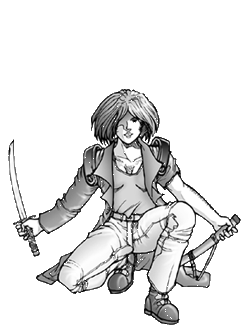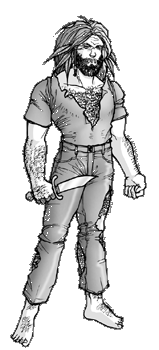

(Homo sapiens capillus)
Noble, feral warriors able to change form at will.
Avg. Height: M - 6'3" F - 6'1"
Avg. Weight: M - 300# F - 250#
Hair Color: Brown, black, red
Eye Color: Brown, hazel, green
Blood Pressure: 130/85
Life Expectancy: 70 years
Dist. Marks: Large build, ruddy skin, claws, fangs, hypertrichosis
|
Shifters are capable of mutating their bodies into powerful weapons, but
these physically imposing changes come at a high price--a lack of control.
The first shifters were the offspring of a male Beta GOTH and a female
human, a union which inadvertantly created one of the most successful
mutations ever witnessed in the history of genetics. Because of their Beta
father, shifter fetuses are initially flooded with the nanites that all the
goth genotypes possess, but the influence of a human mother's womb causes a
significant mutation in these nanites, causing them to alter the growing
shifter's biological structure before self-destructing shortly after birth.
Because of this mutation, shifters lack nanites in their bloodstreams, and
are thus far more "human" than the other goth genotypes, as well as far more
capable of breeding amongst themselves as well as with other humans. At the
end of the 21st Century, there were more than 15,000 shifters alive, though
exactly how many more is impossible to determine due the shifters'
impressive fertility and defiance of standard social conventions like
marriage and monogamy.
Although their specific capabilities vary from family unit to family unit,
all shifters possess biological capabilities that are quite similar to those
of their ancestors. This includes an enhanced central nervous system (CNS),
with an improved spinal column and wider muscle sense and touch nerve fibers
giving shifters enhanced reflexes. Like the other goth genotypes, the
shifter nervous system also contains a secondary "brain stem" at the base of
their spine. However, in shifters this organ is little more than an
extension of their spine, incapable of processing anything except low-level
nervous reactions, reflex arcs and fast-twitch muscular actions. The
shifter's muscular and skeletal structure is enhanced in other ways, giving
them larger builds and impressive strength that's only bested by ragers and
some few goths at the peak of physical prowess.
Unusually and somewhat inexplicably, shifters also have more than 10 times
as many enzymes within their bodies than humans, a condition which gives
them a wide range of capabilities. Exactly how and why the shifter's bodies
are able to produce mass quantities of these enzymes is unknown, although it
is quite clear that the nanites that flood a shifter's body through
gestation and into his or her formative years are the cause of the mutation.
Like normal enzymes, those in a shifter's body are organic catalysts with
precise chemical definitions which reduce the energy required to start
molecular reactions in the body. The thousands of different enzymes in the
body are highly particular, and won't catalyze just any reaction, but only
those which are specifically suited for the enzyme. The metabolic enzymes in
a shifter's body take advantage of the shifter's Beta GOTH genes to bring
about changes in his or her body. These include a wide array of improved
normal enzymatic functions such as helping with detoxification (it's very
hard to get a shifter drunk), enhanced regenerative ability and improved
stamina, and even improving thought processes and keeping the circulatory
system functioning in a stable fashion, even in times of stress.
Capabilities well outside the range of normal human function are also
possible. For example, in normal humans, a reaction between actin (a
protein) and myosin (an enzyme) results in muscular contraction and
function; in a shifter, the improved function of this enzyme brings about
not only increased strength and endurance, but the ability to change
muscular structure. With proper control and training, a shifter can actually
consciously control the flow of enzymes in his or her body, causing muscles
to bulk up, bones to thicken, fangs to grow longer, flesh to mend, etc.
Since enzymatic reactions are not as precise as nanite manipulation of these
same body functions, a shifter's transformations are fast, rough and quite
restricted in scope; even the most powerful and knowledgeable shifters
cannot precisely control the degree to which their bodies change. However,
shifters make up for a lack of control with their intense energy, brutal
force and blinding speed.
The same enzymes which give shifters their abilities also present a unique
biological problem. Enzymes have a limited life, and once they have
completed their appointed task they are destroyed and must be replaced. This
is partly because these enzymes are used up in normal reactions, and partly
because the immune system relies almost totally on enzymes to fight off
bacteria, viruses, carcinogens and other chemicals. Not only does a decrease
in the amount of enzymes result in decreased ability to manipulate the body,
bit also in a weakened immune system. This means much more than merely
catching the flu or a cold, however: once illness or infection have invaded,
a body lacking enzymes must work overtime to produce enzymes the immune
system needs to overcome the problem. When it cannot produce enough, the
results are varied: cancer, arthritis, high blood pressure, circulatory
problems, diabetes, hepatitis, joint pain, and more. Since enzymes also
regulate energy level, shifters who are low on enzymes tend to feel
constantly fatigued. This is exacerbated by the fact that shifters carry
around a lot of extra mass, and must take in more fuel than a normal human
being. Not only must they eat a healthy, balanced diet that includes far
more food than a normal human might need, but they often need to supplement
their diets with extra doses of enzymes, vitamins and minerals.
This is somewhat exacerbated by the fact that shifters also suffer from the
genetic condition which plagues all the core goth genotypes: porphyria. In
shifters, this condition brings about a wide array of medical conditions,
including slight anemia, photosensitivity, erythrodontia (resulting in red,
pointy teeth and fangs) and, most notably, severe hypertrichosis, a
condition which causes the growth of "fur" all over the bodies of male and
female shifters alike. In some cases, shifters go to great lengths to
obsessively shave or remove this hair (even though it inevitably grows
back), while others accept it and actually benefit from it to some degree,
since it provides some level of protection from sunlight. Even so, most
shifters prefer the nightlife, avoiding direct sunlight and only traveling
by day if they are covered up or moving along below an overcast sky.
Knowing this, it strikes many as somewhat strange that shifters seem to
enjoy travel, constantly moving about as often as possible and only settling
down in one area for brief periods of times. Many raised by Beta GOTH
fathers that tended to leave without ever seeing their children born, the
original few shifters grew up in the wilderness of the Pacific Northwest and
grew accustomed to moving around as well. Others ingratiated themselves with
American Indian families in that area, and adopted many of their practices
and beliefs including a love for the open countryside. Another reason for
this incessant wandering is believed to be a genetic one: shifters are
extremely fertile, and seem to be genetically predisposed to "sowing their
seed" as far and as wide as they can. Many shifters will take several
spouses in defiance of local laws and customs, and regularly boast about how
many children they have, listing dozens of names and birthdays. Large family
groupings consisting of fathers, mothers, children, cousins, aunts, uncles
and grandparents all living in the same area are common, with the average
"core shifter family unit" made up of a father, one or two mothers and from
three to ten children per mother. Astonishingly, a shifter mother can easily
give birth to dozens of children in a span of 10 to 15 years (with multiple
births the norm).
Shifter "tribes" or "packs" follow structures loosely based around those of
Amerindian tribes, with each group having a warrior leader and a spiritual
leader known as a shaman (usually the Alpha Male and Female, the most
powerful shifters in the clan). However, the beliefs they share (almost to a
person) are not wholly American Indian, but rather a unique religious
amalgam that also includes elements of Shinto, "the way of the gods," and
Bushido, "the way of the warrior." Many shifters see themselves as noble
warriors, spiritual ancestors of the samurai, serving the land and each
other, protecting the living while revering and remembering the dead. Their
philosophy and their physical prowess also combine to give them a unique
mindset, turning devout shifters into fearless warriors with the peace and
power to serve each other and die to protect their beliefs without breaking
a sweat or raising their voice in anger. Many of these choose to openly act
out the role of warrior, wearing a "daisho" composed of katana and
wakizashi, while the less reserved among them prefer the more natural "long
and short" of claw and fang. Combined with the fact that some embrace
totemic and ritualistic practices such as choosing tribal totem animals and
proudly wearing their hair in symbolic dreadlocks and feathered braids,
shifters tend to stand out in a crowd, to say the least.
Because they are so radically different and foreign to the "modern" way of
dealing with the world, shifters are typically outcast from human society.
This suits most shifters just fine, as they tend to find comfort within
their families, sharing a bond that goes beyond mere blood. Not all are
content to live within the "confines" of a family unit, however, even an
extended one, and some shifters "go ronin" and wander in and out of human
society, selling their capabilities as freelance mercenaries. Others use
their abilities to defend nature, becoming forest rangers, park attendants
and staunch environmentalists. Still others, growing more accustomed to life
in the city, simply join the ranks of workers in factories, diligently
performing their duties.

INSPIRATIONAL IDEAS
Music: Heavy metal, Pantera, Tool, Korn, Rage Against the Machine
Stories: Wolverine comics, Kurosawa samurai films, Ghost Dog
Quote: "The evolution of the human race will not be accomplished in the ten
thousand years of tame animals, but in the million years of wild animals,
because man is and will always be a wild animal." --Charles Darwin
Stats:
* Superior Physical Strength & Endurance.
* Below average Mental Agility & Strength.
Pros:
* Shifters are familial, almost never alone.
* Shifters can rapidly mutate into various animalistic forms.
* Their innate strength and wild ferocity make Shifters fearsome fighters.
Cons:
* Shifters do not have full control over their mutations.
* Typically large and hairy, Shifters have a hard time blending in.
|











